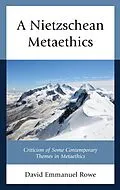This book develops a novel interpretation of the late-nineteenth-century German philosopher Friedrich Nietzsche as holding a distinct and original metaethical position (a theory about our practice of ethics). David Emannuel Rowe characterizes it as a human-centered metaethics. A central achievement of A Nietzschean Metaethics is to bring Nietzsche into a conversation with the analytic metaethical tradition. To do so, Rowe interprets Nietzsche's use of such concepts as the notorious "will to power"; his ideal agent, the superman or Übermensch; nihilism; the eternal recurrence; Perspectivism; and Being and Becoming. The result is a view of Nietzsche as a radical moral error theorist, which is to say he defends the view that all statements that appeal to some value for their truth are false. This theory is radical because Nietzsche argues that insofar as language requires certain concepts for its truth it is in error, in virtue of an appeal to some value. Rowe also offers a view where the increase in one's power is a standard by which one can make sense of Nietzsche's so-called re-evaluation of all values. By means of this resolution, Nietzsche criticizes some contemporary themes in metaethics, such as particular views about moral motivation, reasons, moral error theory, and agency.
Autorentext
David Emmanuel Rowe is sessional lecturer and tutor at Deakin and Monash universities.
Klappentext
This book develops a novel interpretation of the late-nineteenth-century German philosopher Friedrich Nietzsche as holding a distinct and original metaethical position (a theory about our practice of ethics). David Emannuel Rowe characterizes it as a human-centered metaethics. A central achievement of A Nietzschean Metaethics is to bring Nietzsche into a conversation with the analytic metaethical tradition. To do so, Rowe interprets Nietzsche's use of such concepts as the notorious "will to power"; his ideal agent, the superman or Übermensch; nihilism; the eternal recurrence; Perspectivism; and Being and Becoming. The result is a view of Nietzsche as a radical moral error theorist, which is to say he defends the view that all statements that appeal to some value for their truth are false. This theory is radical because Nietzsche argues that insofar as language requires certain concepts for its truth it is in error, in virtue of an appeal to some value. Rowe also offers a view where the increase in one's power is a standard by which one can make sense of Nietzsche's so-called re-evaluation of all values. By means of this resolution, Nietzsche criticizes some contemporary themes in metaethics, such as particular views about moral motivation, reasons, moral error theory, and agency.
Inhalt
Contents
Acknowledgments
List of Abbreviations
Chapter 1: Nietzsche as an Opponent to Meta-ethics
Chapter 2: A Nietzschean Error Theory
Chapter 3: Nietzsche's 'Positive' Alternative
Chapter 4: The Prescriptivity of Moral Values
Chapter 5: Towards Nietzsche's 'Positive' Alternative
Chapter 6: Nietzsche's Three Norms of Power
Chapter 7: Nietzsche as an N-Realist
Chapter 8: Nietzsche's Re-evaluation of all Values
Chapter 9: Nietzsche as a Viable Opponent to Contemporary Themes in Meta-ethics
References
About the Author
